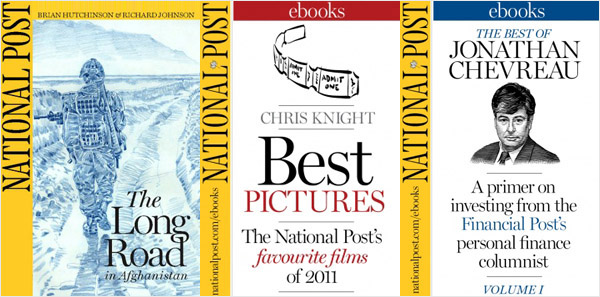

Christie Blatchford demands eyeballs. In Canadian journalism, this is an almost universal truth — the controversial columnist is often derided, but almost always read. So it makes sense that, after poaching her (back, as it happens) from the rival Globe and Mail in June 2011, The National Post would want to use her writing in an early foray into a new medium — ebooks.
The Post, one of Canada’s two national newspapers, has undertaken a unique approach to publishing and selling ebooks: sheer volume. Since December, in less then three months, the paper’s published six ebooks — at a time when even many larger news organizations are testing the waters more hesitantly. The Post is trying it all — long-form reportage, columnist best-ofs, investment advice, and even movie reviews — all in an effort to learn what works as quickly as possible.
The Post’s first ebook was The Long Road, originally a web feature exploring Canada’s role in the Afghanistan war, and an archive of articles spanning from 2001 to present. Since then, ebooks from the Post have included a collection of Terence Corcoran’s columns on Nortel’s collapse; a compilation of pieces by conservative columnist Barbara Kay; an investment guide from personal-finance columnist Jonathan Chevreau; and a bundling of positive movie reviews from Chris Knight. Their most successful book is also their most recent: Killed Because They Were Girls, written mostly by Blatchford as she covered the Shafia “honor killings” trial in Ontario.
“We think the combination of it being a newsworthy story, and it being Christie’s writing, led to it doing well,” Duncan Clark, vice president of digital media at the National Post, told me. “That’s been instructive of what we’re going to do afterward.” The Post isn’t releasing sales figures for any of their ebooks. But Clark did say that those focusing on specific stories have tended to outsell mere collections of columnists’ work.
The Post plans to keep up the pace: It aims to publish about two books per month for the foreseeable future.

Publishing on this scale and in this volume has left the Post in a unique position — they are one of the first publications in Canada to actually pump out timely, topical ebooks to readers, giving them a market advantage. Most of the titles sell for 99 cents, although Blatchford’s goes for $1.99 and The Long Road for $2.99. They’re available on all the usual ebook platforms, including for the Canadian Kobo e-reader. Kindle, Kobo, and iBooks are the three most popular formats, Clark said, but there is no clear leader between the three. Some have sold more on the Kobo, for instance, while others have seen more success on iBooks (like Killed Because They Were Girls).
Though the Post’s digital team had been considering ebook opportunities, the catalyst came through a proposal from HarperCollins Canada. They ended up partnering with the publishing house, who acts as distributor for the National Post-controlled content.
“We didn’t come into this assuming we knew anything,” says Clark. “That’s part of the reason we wanted a relationship with a distributor.” HarperCollins is in charge of merchandising, meaning they place books in the online stores and make sure they’re seen on virtual shelves. Clark says this is key to reaching new readers — for the books, and for the paper.
Marketing for the ebooks has been primarily focused around the Postmedia Network, which owns the National Post and a large number of regional and city newspapers across Canada. This includes traditional ads in the network papers and online. (Today, at least, the front page of the National Post website features a prominent ad for the Kay ebook in its top right corner.) Editors have also been plugging ebooks in relevant places like chats with the authors.
The allure of ebooks to news organizations is obvious: the potential to take work produced for one medium and — with a little repackaging — sell it in a different one, one where readers are more accustomed to paying for content. Clark admits that right now the paper is focused on experimentation, gathering data on what works and what doesn’t before focusing on a route with a financial pay-off.
“We’re conscious about not creating fatigue,” he says. “And if the data says that’s happening, we’ll re-evaluate.”